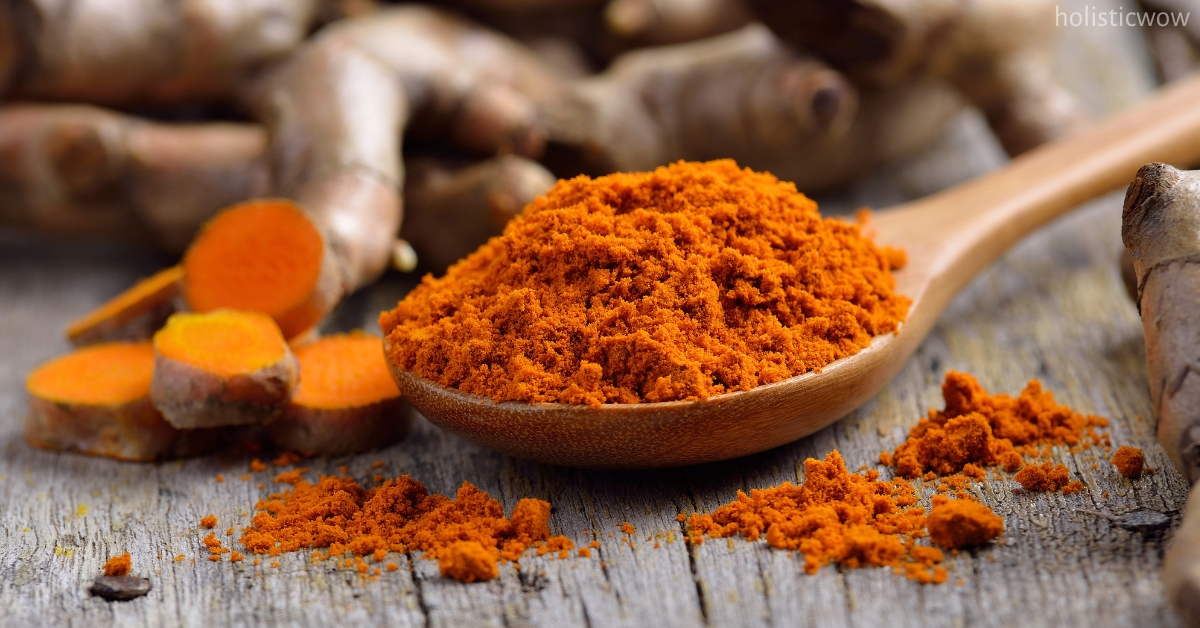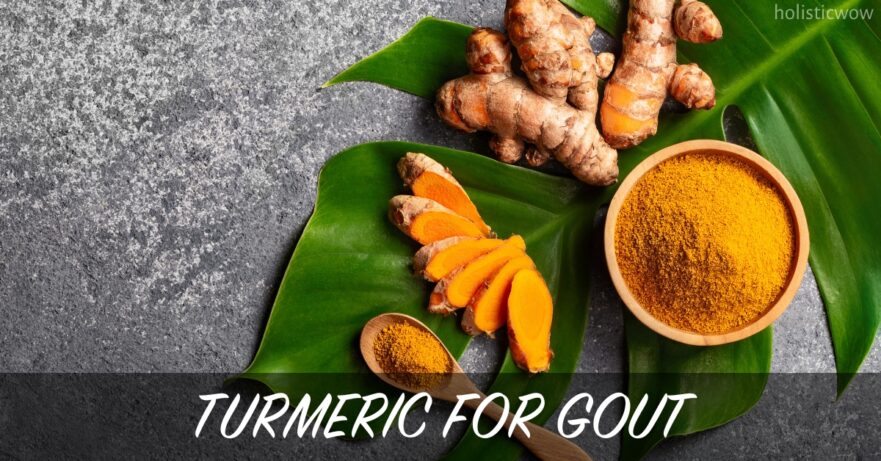What Are the Benefits of Using Turmeric for Gout?
Turmeric, particularly its active compound curcumin, may benefitt hose managing gout.
It is known for its anti-inflammatory properties, which could help reduce joint inflammation and swelling associated with gout.
Additionally, some research suggests that turmeric might modulate uric acid levels, potentially helping to prevent gout attacks. However, the findings on this are mixed and not yet conclusive.
While turmeric does not directly address the root cause of gout—uric acid buildup—it may complement conventional treatments.
Some studies indicate that turmeric supplements could help alleviate gout symptoms , mainly by reducing inflammation.
However, more research is needed to fully confirm these effects and determine the most effective dosage and formulation.
Key Takeaways
- 🌿 Anti-Inflammatory Properties: Turmeric, especially curcumin, may help reduce gout-related joint inflammation and swelling due to its anti-inflammatory effects.
- 🧪 Uric Acid Modulation: Although turmeric might influence uric acid levels, its direct impact on lowering them is unclear and requires further research.
- 🧉 Enhancing Bioavailability: Combining turmeric with black pepper or using specialized formulations like nanoparticles can significantly improve curcumin absorption, enhancing its effectiveness.
- 🩺 Complementary Approach: Turmeric can be a supportive addition to traditional gout treatments, but it should not replace prescribed medications or medical advice.
What Are the Anti-Inflammatory Properties of Turmeric?
Turmeric’s anti-inflammatory properties primarily come from curcumin , its active component.
Curcumin helps regulate inflammation by suppressing NF-kappa B, a key protein involved in the body’s inflammatory response. This action may help reduce inflammation and joint pain in conditions like gout.
Research suggests that curcumin inhibits cytokines, proteins that trigger inflammation, potentially decreasing swelling and discomfort in affected joints.
Additionally, curcumin has been shown to protect cells from inflammatory damage by preventing mitochondrial dysfunction and reducing oxidative stress.
While turmeric may be beneficial in managing inflammatory conditions, its effectiveness can be limited by poor absorption in the body. Combining curcumin with substances like piperine (from black pepper) or specialized formulations such as turmeric nanoparticles can significantly enhance its bioavailability.
These properties make turmeric a promising natural option for supporting joint pain relief and overall inflammation management.

How Does Curcumin in Turmeric Help with Gout Symptoms?
Curcumin may help reduce gout symptoms by blocking inflammatory pathways and lowering markers of inflammation.
This action can help decrease joint pain and stiffness, which are common in gout.
Additionally, curcumin may help support physical function, offering a natural approach to managing these symptoms.
Curcumin could potentially help relieve symptoms by targeting inflammation, which is directly linked to gout attacks. However, its effectiveness may vary, and combining it with agents like piperine or lipid-based formulations can enhance its absorption for better results.
Can Turmeric Reduce Uric Acid Levels?
Turmeric, particularly its active component curcumin, may help modulate uric acid levels in the body, but its direct uric acid-lowering effects remain unclear.
Some studies suggest that curcumin has anti-inflammatory properties that may support gout management. Still, others indicate that it does not significantly reduce serum uric acid levels compared to a placebo.
While turmeric could be a complementary option to traditional treatments for gout, more research is needed to fully understand its impact on human uric acid levels.

How Effective Is Turmeric in Managing Gout-Related Joint Pain?
Turmeric, particularly curcumin, may help manage gout-related joint pain due to its anti-inflammatory properties and potential for pain relief.
Research suggests that curcumin can reduce inflammation caused by monosodium urate crystals, which contribute to gout flare-ups.
Additionally, studies indicate that curcumin may improve physical function in individuals with arthritis, suggesting possible benefits for those with gout as well.
Regular turmeric use could be a natural option for managing joint pain in gout sufferers.
However, while early findings are promising, more research is needed to confirm its effectiveness in humans fully.
Since curcumin has low bioavailability, combining it with black pepper (piperine) or advanced formulations like curcumin nanoparticles may enhance its absorption and potential benefits.
How Can Turmeric Be Used for Gout Management?
Turmeric may support gout management in several ways :
- turmeric powder can be added to meals,
- turmeric supplements and extracts provide a more concentrated option,
- turmeric tea and golden milk offer a soothing way to consume turmeric while benefiting from its potential anti-inflammatory properties.
To improve the bioavailability of curcumin, turmeric’s active compound, it can be combined with black pepper, which contains piperine. Piperine has been shown to enhance curcumin absorption, making it more effective in the body.
Some research suggests that turmeric nanoparticles may provide enhanced anti-inflammatory effects and better bioavailability than traditional turmeric forms.
In animal studies, these nanoparticles showed potential for reducing uric acid levels and improving joint health , though more human studies are needed to confirm these effects.
When using turmeric for gout management, taking a balanced approach that includes other lifestyle modifications and medical guidance from healthcare professionals is crucial.

What Is the Recommended Dosage of Turmeric for Gout?
The recommended dosage of turmeric for managing gout can vary.
Research suggests that taking 500 to 2000 mg of curcumin daily, divided into two or three doses, may provide health benefits.
While some studies indicate that even higher doses are generally safe, individual needs can differ. It is essential to consult a healthcare provider for personalized recommendations.
Turmeric supplements that contain piperine (a compound found in black pepper) or lipid-based curcumin formulations may enhance curcumin absorption, potentially making them more effective.
Since curcumin has poor bioavailability, choosing a supplement with an absorption enhancer can be beneficial.
Although turmeric may help manage inflammation associated with gout, its direct effect on serum uric acid levels remains uncertain. Under professional guidance, always start with a lower dose and adjust as needed.
Should You Use Turmeric Supplements or Powder for Gout?
Both turmeric supplements and powder may help manage gout, as turmeric contains curcumin , an anti-inflammatory compound.
Turmeric supplements typically contain a higher concentration of curcumin, which may help reduce joint inflammation and discomfort associated with gout. Some supplements also include piperine (from black pepper) to enhance absorption.
On the other hand, turmeric powder is a convenient way to incorporate turmeric into your diet through dietary modifications, such as adding it to meals, smoothies, or teas. While it contains less curcumin than supplements, regular consumption may still provide mild anti-inflammatory benefits.
The choice between supplements and turmeric powder depends on personal preference and how you wish to include turmeric in your routine.
Supplements may be a better option if you prefer a more concentrated form of curcumin, especially if they contain absorption-enhancing ingredients.
Turmeric powder could be ideal if you enjoy cooking and want a natural way to add curcumin to your diet.
It’s important to follow the recommended dosages on supplement packaging and consult a healthcare professional for guidance tailored to your specific needs, especially if you have existing health conditions or take medications.
How Does Turmeric Tea or Golden Milk Help with Gout?
Turmeric tea and golden milk are popular ways to consume turmeric , which contains curcumin which is known for its anti-inflammatory properties.
These beverages may help reduce inflammation and relieve pain for those experiencing gout flare-ups.
While turmeric does not directly lower uric acid levels, its anti-inflammatory effects could ease discomfort and support overall symptom management.
Incorporating turmeric tea or golden milk into a balanced diet may help manage inflammation and provide soothing relief during gout episodes.
For better absorption, consuming turmeric with black pepper, which contains piperine, can enhance curcumin’s effectiveness.
What Are the Risks and Precautions of Using Turmeric for Gout?
Using turmeric for gout is generally safe, but some precautions must be considered.
High doses of turmeric supplements can cause gastrointestinal issues, including nausea, diarrhea, or an upset stomach.
Turmeric may interact with certain medications, such as blood thinners and diabetes medications, potentially altering their effectiveness.
Individuals with bleeding disorders, kidney stones, gallbladder disease, or iron deficiency should exercise caution.
Pregnant or breastfeeding women should avoid turmeric supplements unless advised by a healthcare professional, as safety data in these groups is limited.
Before starting turmeric supplements, consult a healthcare provider to ensure they suit your specific health needs. Turmeric should not be used as a replacement for conventional medical treatment.
Herbal Preparations and Recipes for Gout
Herbal remedies can help manage gout by utilizing certain herbs’ potential anti-inflammatory and uric acid-modulating properties. The following recipes focus on turmeric and its possible benefits for gout management.
While these remedies may offer supportive benefits, they are not substitutes for medical treatments. Always consult a healthcare provider before starting any new herbal regimen, especially if you have existing health conditions or are taking medications.
Turmeric Anti-Inflammatory Tea
Ingredients:
- 1 teaspoon turmeric powder
- 1 cup of boiling water
- A pinch of black pepper (to enhance absorption)
Preparation:
- Combine turmeric powder and black pepper in a cup.
- Pour boiling water over the mixture.
- Stir well and let it steep for 10 minutes.
- Strain if desired and drink up to 1-2 cups daily.
This simple tea leverages turmeric’s potential anti-inflammatory properties, making it a beneficial addition to your routine for managing gout symptoms. Adding a squeeze of lemon or a teaspoon of honey can enhance flavor and offer additional antioxidants.
Warnings: Turmeric can interact with blood thinners, antacids, and diabetes medications and may cause gastrointestinal upset in some individuals. Due to its oxalate content, excessive consumption can also lead to kidney stone formation in susceptible individuals. Consult a healthcare provider if you are on medications or have health conditions.
Turmeric and Herbal Gout Relief Blend
Ingredients:
- ½ teaspoon dried turmeric root
- ½ teaspoon dried ginger root
- ½ teaspoon dried dandelion leaf
- ½ teaspoon dried nettle leaf
- ½ teaspoon dried meadowsweet leaf
- 1 cup of boiling water
Preparation:
- Combine all the dried herbs in a teapot.
- Add boiling water and steep for 15 minutes.
- Strain and drink up to 1 cup two to three times daily.
This herbal blend combines the potential anti-inflammatory effects of turmeric and ginger with the diuretic properties of dandelion and nettle, supporting the body’s ability to manage gout symptoms effectively. Meadowsweet offers additional anti-inflammatory support but should be used cautiously in individuals sensitive to salicylates.
Warnings: Dandelion may interact with diuretics and can cause allergic reactions in some individuals. Nettle may also interact with blood thinners and blood pressure medications. Meadowsweet contains natural salicylates and should be avoided by those allergic to aspirin. Pregnant or breastfeeding women should consult a healthcare provider before using these herbs. Consult a healthcare provider if you have existing health conditions or are taking medications.
These herbal preparations aim to support gout management through their natural properties. While some herbs may help reduce inflammation or support uric acid elimination, they should be used as complementary approaches rather than replacements for conventional medical treatments. Always consult a healthcare provider before starting any new herbal regimen, particularly if you have existing health conditions or are taking medications.

